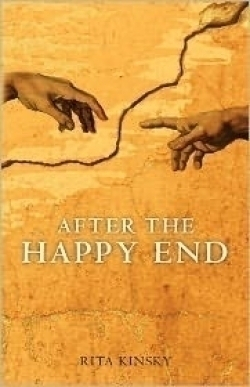After the Happy End
After the Happy End is the story of a Russian American woman and her struggles as a divorced mother who is devoted to her son. The story is a very candid and informational narrative about the ups and downs of a woman’s life in all her roles from daughter to divorced, single woman, to mother and wife. While the story is filled with many moments of raw emotion with which the reader can identify, the narrative can be overwhelming in that it lacks descriptive passage necessary to provide a full landscape for the story. This lack of description is especially missed with the mention of cultural and historical events associated with the woman’s family history in Russia.
The book begins with a Preface followed by Notes, which are entitled: “Things my grandma had said or could have said.” While many of the expressions are entertaining and enlightening, some of the eighteen quotations are a little cryptic and less insightful than if only a few expressions were presented. For example, “There are two categories of the people in the world: those who can open someone’s briefcase or someone’s letter, even just to look into it, and those who cannot do it for the world.” It would be intriguing to read the story behind the grandmother saying this, or to discover the first time the grandmother used this expression.
The Prologue that follows the Notes contains flashbacks of the woman’s interaction with her son when he was younger and her marriage and life were more stable. Then in Chapter One the reader is introduced to the narrator, Victoria, or Vika as she is called by her friends, and she begins to tell her story; why she left Russia, her failed marriage, how her relationship with her son changed, and her own experiences dating and growing as an individual. The headings of Preface, Notes, and Prologue before the story is a little confusing and creates a slower start than if the reader were to plunge straight into the story.
Victoria’s story is candid, filled with emotion and angst in the telling narration of dialogue and interaction in her relationships with friends, family, suitors, and the new love of her life, Alex. Victoria’s story is rich in observations about differences in generations, Russian and American culture, and the relationship between men and women and blended families. There are some wonderful telling details that give insight to the state of affairs at the time, such as mention of Victoria’s grandfather being a “wonderful catch” because he worked at a bread factory so he could bring home bread. There are many well-developed scenes in which author Rita Kinsky brings the characters and scenes to life, such as in the presentation of her parents, and her father’s temperament through his dialogue, or the scenes around the family dining table.
Although the ending is somewhat surprising and abrupt, After the Happy End is a story that touches on many rich fields of possibilities but leaves the reader feeling teased and wanting the full stories told and the landscape completely painted.
Reviewed by
Maya Fleischmann
Disclosure: This article is not an endorsement, but a review. The publisher of this book provided free copies of the book and paid a small fee to have their book reviewed by a professional reviewer. Foreword Reviews and Clarion Reviews make no guarantee that the publisher will receive a positive review. Foreword Magazine, Inc. is disclosing this in accordance with the Federal Trade Commission’s 16 CFR, Part 255.

